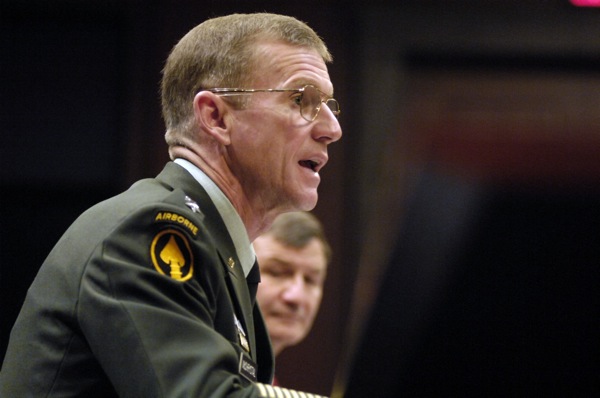McChrystal Sees Taliban Defeat in 18 Months
McChrystal forcefully defended the Obama administration’s revised strategy, its weeks-long decision-making process and President Obama’s ultimate decision to deploy 30,000 additional U.S. troops for the war effort.
Jul 31, 2020514 Shares513.7K Views
Gen. Stanley McChrystal testifies before the House Armed Services Committee on Tuesday as Amb. Karl Eikenberry looks on. (Louie Palu/ZUMA Press)
In confirmation hearings six months ago, Gen. Stanley McChrystal painted a bleak picture of an Afghanistan plagued by a growing insurgency. But in two marathon congressional hearings on Tuesday, McChrystal, now the commander of U.S. and NATO forces in Afghanistan, spoke with certainty about success unfolding over the next 18 months.
“I absolutely believe that we — and I mean the government of Afghanistan with coalition help — can defeat the Taliban,” McChrystal said. “And I define that by meaning putting the Taliban in a position where they can no longer accomplish their objective of threatening the government of Afghanistan.”
Testifying beside Amb. Karl Eikenberry, the U.S. ambassador to Afghanistan, McChrystal forcefully defended the Obama administration’s revised strategy, its weeks-long decision-making process and President Obama’s ultimate decision to deploy 30,000 additional U.S. troops for the war effort. The troop increase, McChrystal said, “provides me with the resources we need to execute the mission as outlined for us.”
[Security]Congressional Republicans lauded McChrystal, but pressed him on whether Obama ought to have deployed even more troops, citing media reports that McChrystal really wanted 40,000 troops. McChrystal assured them the president’s troop surge was sufficient. Citing an expected increase in non-U.S. NATO troops to complement what the Obama administration is calling an “extended surge,” McChrystal told the House Armed Services Committee that “the key thing is I’m going to get at least 37,000.” He continued, “What I recommended did not say ‘U.S.,’ it said ‘forces.’” The general clarified that not only did the administration not stifle his recommendations, it “demanded” he be candid about his requirements.
Still, some Republicans remained uncomfortable with the administration’s July 2011 date to begin transitioning security responsibilities to the Afghan National Army and Police. Sen. John McCain (R-Ariz.), the ranking Republican on the Senate Armed Services Committee, saidthat although he largely endorsed the administration’s approach to Afghanistan, they would have to “agree to disagree” on the wisdom of announcing the date.
But both McChrystal and Eikenberry replied that the administration was ultimately providing a long-term commitment to Afghanistan, even if the U.S.-led combat phase would diminish over time. McChrystal said setting the date for beginning a “conditions-based” transition would help navigate Afghans’ complex feelings about the presence of foreign troops on their soil. “The guarantee that we, the coalition, will support them but not stay too long is actually a positive,” McChrystal testified. Eikenberry emphasized that the Obama administration envisioned a “long-term relationship with Afghanistan, a diplomatic relationship, a long-term economic assistance relationship” after the ultimate departure of U.S. troops.
The general saidhe expressed such confidence in his strategy because the Taliban was “not credible as a political entity,” earning acquiescence from Afghans only through the lack of a credible alternative from the Afghan government and its NATO allies. As the U.S. flows forces into southern and eastern Afghanistan to establish “contiguous security” for the population, “the next 18 months will likely be decisive,” McChrystal said. “Rolling back the Taliban is a prerequisite to the ultimate defeat of al-Qaeda.”
While the two hearings were devoid of major political spectacles, there were still moments of doubt and caution, particularly about the Afghan security forces, Sen. Carl Levin (D-Mich.) expressed alarmthat insufficient Afghan forces meant that holding territory in southern Afghanistan would continue to be an “overwhelmingly American” task in the near term. McChrystal testifiedthat the Taliban, which claims the allegiance of about “24,000 [to] 27,000 full time” fighters, pays its recruits $300 per month — more than the Afghan government pays its own soldiers and policemen. Saying that the Afghan government was working to raise soldier and police salaries, McChrystan expected the Afghan security forces to number about 300,000 by the summer of 2010.
In an attempt to quash media speculation about a chilly relationship between Eikenberry and McChrystal, the two men made a show of their professional partnership. Eikenberry saw his internal doubts about a U.S. troop increase leak to the media last month. But ambassador saidthat he firmly supported the administration’s strategy and was “exactly aligned with Gen. McChrystal.” The general returned the compliment by gesturing to Eikenberry and saying, “The person I listen to most is about three feet on my right.”
Both men largely demurred on questions about the impact of Pakistan on Afghanistan strategy, saying their portfolios largely ended at the Afghan side of the border. The Senate Foreign Relations Committee will hold a hearing with Eikenberry and Gen. David Petraeus, commander of U.S. forces in the Middle East and South Asia, on Wednesday morning, to get “a broader perspective beyond just Afghanistan,” accordingto committee spokesman Frederick Jones. McChrystal was not invited to testify at that hearing, but he will brief the House Foreign Affairs Committee on Thursday morning with Eikenberry.
McChrystal said he would return to the committees to provide updates following another administration review in December 2010, pledging candid military advice. But McChrystal said he fully expected to have progress to report, since the U.S. would soon devote “30,000 more Americans and coalition forces” to Afghanistan to “go hard at this insurgency over the next 18 months.”

Hajra Shannon
Reviewer
Latest Articles
Popular Articles
